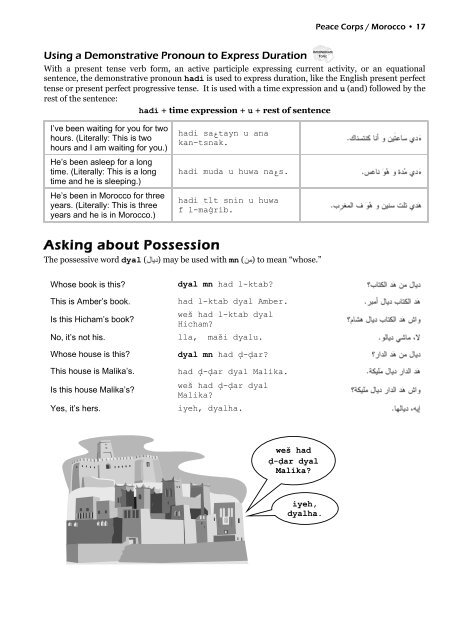Moroccan Arabic textbook 2011
Moroccan Arabic textbook 2011
Moroccan Arabic textbook 2011
You also want an ePaper? Increase the reach of your titles
YUMPU automatically turns print PDFs into web optimized ePapers that Google loves.
Peace Corps / Morocco • 17<br />
Using a Demonstrative Pronoun to Express Duration<br />
INTERMEDIATE<br />
TOPIC<br />
With a present tense verb form, an active participle expressing current activity, or an equational<br />
sentence, the demonstrative pronoun hadi is used to express duration, like the English present perfect<br />
tense or present perfect progressive tense. It is used with a time expression and u (and) followed by the<br />
rest of the sentence:<br />
hadi + time expression + u + rest of sentence<br />
I‟ve been waiting for you for two<br />
hours. (Literally: This is two<br />
hours and I am waiting for you.)<br />
He‟s been asleep for a long<br />
time. (Literally: This is a long<br />
time and he is sleeping.)<br />
He‟s been in Morocco for three<br />
years. (Literally: This is three<br />
years and he is in Morocco.)<br />
hadi saعtayn u ana<br />
kan-tsnak.<br />
hadi muda u huwa naعs.<br />
hadi tlt snin u huwa<br />
f l-maġrib.<br />
Asking about Possession<br />
The possessive word dyal ( ) may be used with mn ( ) to mean ―whose.‖<br />
Whose book is this<br />
This is Amber‟s book.<br />
Is this Hicham‟s book<br />
No, it‟s not his.<br />
Whose house is this<br />
This house is Malika‟s.<br />
Is this house Malika‟s<br />
Yes, it‟s hers.<br />
dyal mn had l-ktab<br />
had l-ktab dyal Amber.<br />
weš had l-ktab dyal<br />
Hicham<br />
lla, maši dyalu.<br />
dyal mn had ḍ-dạr<br />
had ḍ-dạr dyal Malika.<br />
weš had ḍ-dạr dyal<br />
Malika<br />
iyeh, dyalha.<br />
weš had<br />
ḍ-dạr dyal<br />
Malika<br />
iyeh,<br />
dyalha.


